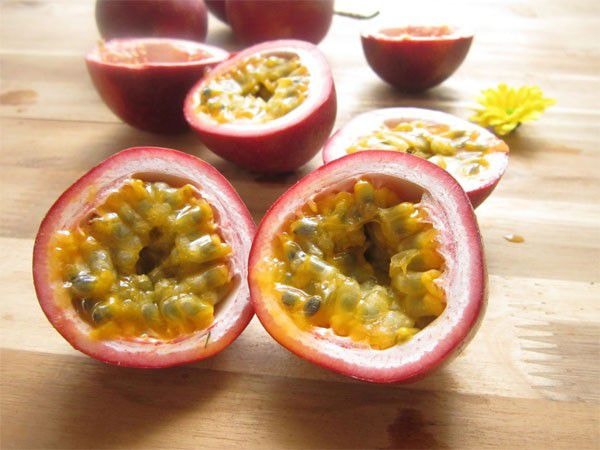Cooling off the summer heat with lemon: Better safe than sorry
Lemon is a great food to help cool down in the summer. However, lemon juice can be harmful to your health if used incorrectly.
Passion fruit
 |
Every summer, passion fruit (also known as passion fruit) becomes a popular refreshing drink. Passion fruit is not only fragrant and cool but also very nutritious, bringing many benefits to the body, helping to cool down in the summer.
In terms of nutritional value, passion fruit contains a lot of vitamins A and C, iron, potassium and other nutrients that provide a very good amount of multivitamins for human health. The mucilaginous pulp surrounding passion fruit seeds is an excellent source of fiber that helps the digestive process, increases health without causing obesity.
However, if you do not know how to use it, passion fruit, like many other nutritious foods, will bring many harmful effects to your health.
Consuming too much passion fruit regularly can lead to side effects like fatigue, nausea, lethargy and vomiting. Sometimes, it can also make you feel dizzy and have irregular heartbeat.
Many people know that the nutrients of passion fruit are found in the mucous layer surrounding the seeds, also known as the seed coat. Therefore, they have the habit of eating the seeds to make the most of this source of nutrients. However, passion fruit seeds do not contain any nutrients, and are also a hard, indigestible material that can burden the digestive system, directly affecting the digestive system.
In addition, if you eat too many passion fruit seeds, they will not be able to be excreted. During the process of moving, if the seeds accidentally fall into the diverticulum of the large intestine, it will cause you to have appendicitis or diverticulitis.
For people with allergies or stomach ulcers, be very careful when using passion fruit. Passion fruit can cause allergic reactions such as hives, difficulty breathing, asthma, angioedema... At the same time, passion fruit has many organic acids that can cause damage to people with stomach ulcers.
Green lemon
 |
We often call the green lemon our lemon. Just like passion fruit, our lemon is a fruit used to make soft drinks or used as a spice. Drinking lemon juice has many health benefits.
Drinking lemon water every morning not only helps with digestion, boosts immunity, but also helps beautify the skin and improve bad breath. Drinking lemon water every day also reduces the overall acidity of the body.
However, drinking too much lemon juice can easily cause bleeding and blood thinning. For people with cold (lack of yang energy), cold in the body, or fatigue, consuming too much lemon will make them feel colder, more tired, more susceptible to colds, or stiff joints, nerve pain. This is because the acidity of lemon is yin. It is this excess acidity that causes stiff muscles, tendons, stomach ulcers, and colon ulcers.
Patients with stomach pain should also limit drinking lemon juice because lemon juice is acidic and can disrupt the digestive tract and stimulate sensitive nerves.
If people with stomach pain drink lemon juice, the digestive tract contains a lot of acid, which can cause stomach pain. In addition, lemon juice can also cause diarrhea in patients with intestinal diseases.
Yellow lemon
Lemons are yellow, oval-shaped citrus fruits. Their juice, segments, and peel, especially their aroma, are used in food. Lemon juice contains about 5% - 6% citric acid, which gives lemons their sour taste. The characteristic sour taste of lemons makes them an important ingredient in foods.
However, like other types of lemon, the ingredients contain acid, so if we drink too much, it is not good, especially not directly concentrated lemon juice. The high acid content in lemon can impair the function of the stomach. Rushing to drink lemon juice in large quantities will cause you to suffer from illness later.
According to Alobacsi.vn


